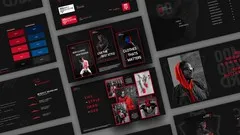
Branding and Customer Experience 
This course explores the relationship between Branding and Customer Experience, providing a framework to focus and organize students' thinking about the operational implications of their branding projects. It will help students understand how branding efforts can be aligned with customer touch points and how to measure the impacts of their projects across multiple departments. ▼
ADVERTISEMENT
Course Feature
![]() Cost:
Cost:
Free
![]() Provider:
Provider:
Coursera
![]() Certificate:
Certificate:
Paid Certification
![]() Language:
Language:
English
![]() Start Date:
Start Date:
10th Jul, 2023
Course Overview
❗The content presented here is sourced directly from Coursera platform. For comprehensive course details, including enrollment information, simply click on the 'Go to class' link on our website.
Updated in [March 06th, 2023]
Learners can learn from this course in three main areas:
1. Branding Strategy: Learners will gain an understanding of the different approaches to defining a branding strategy, and how to apply them to their own projects. They will also learn how to use the framework to focus and organize their thinking about the operational implications of their branding projects.
2. Customer Experience: Learners will gain an understanding of how to align activities and measure impacts across multiple departments and the customer touch points they manage. They will also learn how to use the framework to create a customer journey map and identify areas of improvement.
3. Synergies and Intersections: Learners will gain an understanding of the synergies between branding and customer experience, and how to leverage them to create a successful customer experience. They will also learn how to use the framework to identify areas of overlap and create a unified customer experience.
[Applications]
Students who have completed this course can apply their knowledge to develop a comprehensive branding strategy that takes into account customer experience. They can use the framework they learned to focus and organize their thinking about the operational implications of their branding projects. Additionally, they can use the operational language they learned to align activities and measure impacts across multiple departments and the customer touch points they manage.
[Career Paths]
1. Brand Manager: Brand Managers are responsible for developing and managing the brand strategy for a company. They are responsible for creating and maintaining a consistent brand image across all channels and customer touchpoints. They must have a deep understanding of the target audience and be able to develop creative campaigns that will resonate with them. Brand Managers must also be able to analyze data and use it to inform their decisions.
2. Customer Experience Manager: Customer Experience Managers are responsible for creating and managing the customer experience across all channels and customer touchpoints. They must have a deep understanding of customer needs and be able to develop strategies that will meet those needs. They must also be able to analyze data and use it to inform their decisions.
3. Digital Marketing Manager: Digital Marketing Managers are responsible for developing and managing digital marketing campaigns. They must have a deep understanding of the target audience and be able to develop creative campaigns that will resonate with them. They must also be able to analyze data and use it to inform their decisions.
4. Social Media Manager: Social Media Managers are responsible for developing and managing social media campaigns. They must have a deep understanding of the target audience and be able to develop creative campaigns that will resonate with them. They must also be able to analyze data and use it to inform their decisions.
The demand for these positions is growing as companies are increasingly recognizing the importance of branding and customer experience in their overall success. Companies are investing more in these areas and are looking for professionals who can help them create and manage effective campaigns. As technology continues to evolve, these positions will become even more important as companies look to leverage new technologies to reach their customers.
[Education Paths]
1. Bachelor of Business Administration (BBA): A BBA degree is a great way to gain a comprehensive understanding of the business world and the skills needed to succeed in it. This degree focuses on the fundamentals of business, such as accounting, finance, marketing, and management. It also provides students with the opportunity to specialize in a particular area, such as branding and customer experience. With the rise of digital marketing and customer experience, this degree is becoming increasingly popular and is a great way to gain the skills needed to succeed in the modern business world.
2. Master of Science in Branding and Customer Experience: This degree is designed to provide students with a deeper understanding of the principles of branding and customer experience. It covers topics such as customer segmentation, customer journey mapping, and customer experience design. It also provides students with the opportunity to specialize in a particular area, such as digital marketing or customer analytics. This degree is becoming increasingly popular as businesses look to gain a competitive edge in the digital age.
3. Master of Business Administration (MBA): An MBA is a great way to gain a comprehensive understanding of the business world and the skills needed to succeed in it. This degree focuses on the fundamentals of business, such as accounting, finance, marketing, and management. It also provides students with the opportunity to specialize in a particular area, such as branding and customer experience. With the rise of digital marketing and customer experience, this degree is becoming increasingly popular and is a great way to gain the skills needed to succeed in the modern business world.
4. Master of Science in Digital Marketing and Customer Experience: This degree is designed to provide students with a deeper understanding of the principles of digital marketing and customer experience. It covers topics such as customer segmentation, customer journey mapping, and customer experience design. It also provides students with the opportunity to specialize in a particular area, such as digital marketing or customer analytics. This degree is becoming increasingly popular as businesses look to gain a competitive edge in the digital age.
Pros & Cons

Well designed materials to show relationship between brand and customer experience.

Solid foundation of understanding for CX positions.

Insightful videos and articles.

Wide range of quality in assignments.

Links to articles not working.

Course only in English.
Course Provider

Provider Coursera's Stats at AZClass
Discussion and Reviews
0.0 (Based on 0 reviews)
Explore Similar Online Courses

Perl Tutorial

Pharmacology of Antibacterial Agents

Python for Informatics: Exploring Information

Social Network Analysis

Introduction to Systematic Review and Meta-Analysis

The Analytics Edge

DCO042 - Python For Informatics

Causal Diagrams: Draw Your Assumptions Before Your Conclusions

Whole genome sequencing of bacterial genomes - tools and applications

Branding Success Ultimate 2018 Branding Yourself Materclass

How To Build A Super Brand

Design a brand style guide The Entire Brand Design Process
 Related Categories
Related Categories
 Popular Providers
Popular Providers
Quiz
 Submitted Sucessfully
Submitted Sucessfully
1. What is the main focus of this course?
2. What is the framework used in this course?
3. What is the goal of this course?
4. What is the framework used in this course to focus and organize students' thinking about the operational implications of their branding projects?
Correct Answer: Customer Journey Mapping


Start your review of Branding and Customer Experience